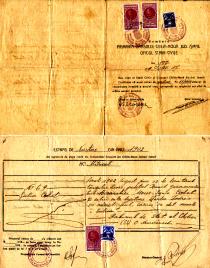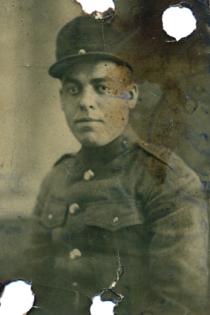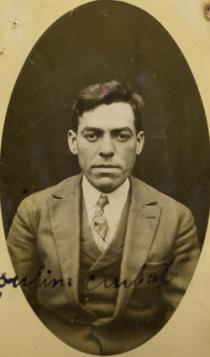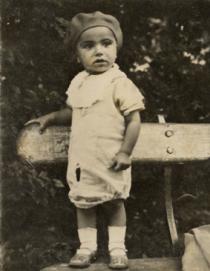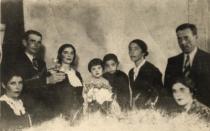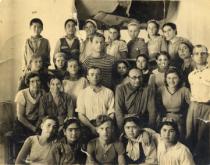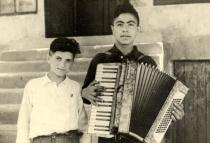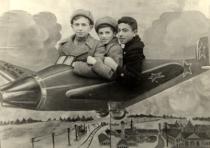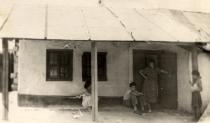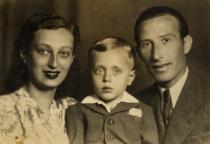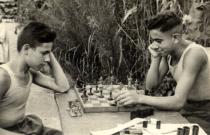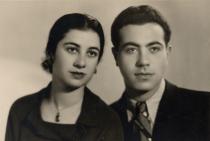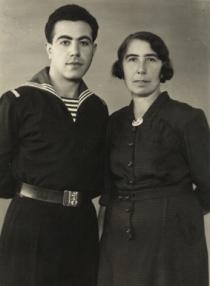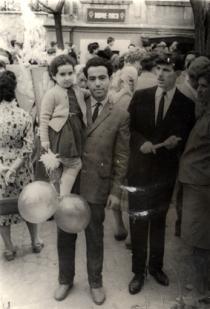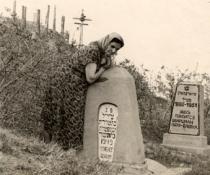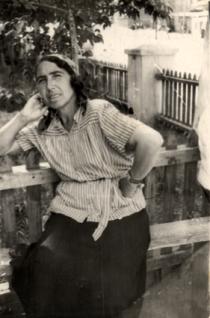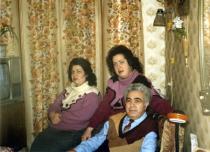This is my family picture. From right to left: my father's cousin Klara Poverennaya [married name Tseitlina], my father Shulim Chubat and my mother Roza Chubat dressed in a summer dress, and I, my cousin Klara, Aunt Etl, Grisha, the husband of my father's sister Sonya and Sonya herself. This picture was taken in Kishinev in 1937.
My father had four sisters: Etl, Sonya, Brana and Blima. The eldest, Etl, born in 1904 lived in Romania with her husband Abram Ladyzhenskiy, and daughter Klara, born in 1932. Abram was a compositor at the typography. He made good money as there were very few skilful compositors at that time. When the Soviet regime came to power, Etl and her family moved to Bessarabia in 1940. They didn't evacuate when the war began. During the occupation they were in the same ghetto as Oizer and his family and my grandmother. When the war was over, Etl's family moved to Kishinev. They had a comfortable living as Abram worked, but in the early 1960s he was afflicted with gangrene and his leg was amputated. He became disabled. The family was then supported by Klara's husband. He was a cobbler, and Klara sold shoes made by him at the market. Aunt Blima, who lived in America at that time, also assisted. In the 1990s, when there was no Iron Curtain any more, she sent money, which was enough to buy tickets and process the documents for the whole family. Thus, Etl, Abram and Klara moved to America with their families. Etl died in America in 1998.
Blima, born in 1910, was a very beautiful girl. She studied in Bucharest. A Romanian fell in love with her. His name was Bari Borti. He knelt in front of my grandmother to ask for Blima's hand. He went through a giyur [circumcision] and all the rituals necessary to become a Jew. Bari was a very wealthy man. He owned several commission jewelry shops. Blima had a fairy-tale life. She often sent my grandmother photographs. I liked looking at them. They had a posh mansion in Bucharest with an orchard, where Blima rode a donkey, bought by her husband. She dressed like a princess. They moved to Canada before the Soviet regime came to power in Bessarabia. Bari managed to carry diamonds, which were hidden in a cane, through the customs. In Canada he opened up a commission jewelry shop. After a couple of years he was robbed and after that incident he wasn't that rich. Though, something was left. He then moved to the USA and purchased a two-storied mansion and a couple of houses to rent out. Bari and Blima had one daughter, whose name I don't remember. I don't keep in touch with them. I don't know whether Blima is still alive. I think that her husband is unlikely to be alive, because he was ten years older than her.
Sonya was born in 1905. She was reported missing during the first days of the war. I don't know what happened to her. Brana, born in 1908, got married before the war. She had a son, Yuzya. I don't know what happened to Brana's husband. She and her son left for Israel with Oizer in 1947. There Brana married a Jew, who had lost his family during the war. She died in the mid 1990s.

